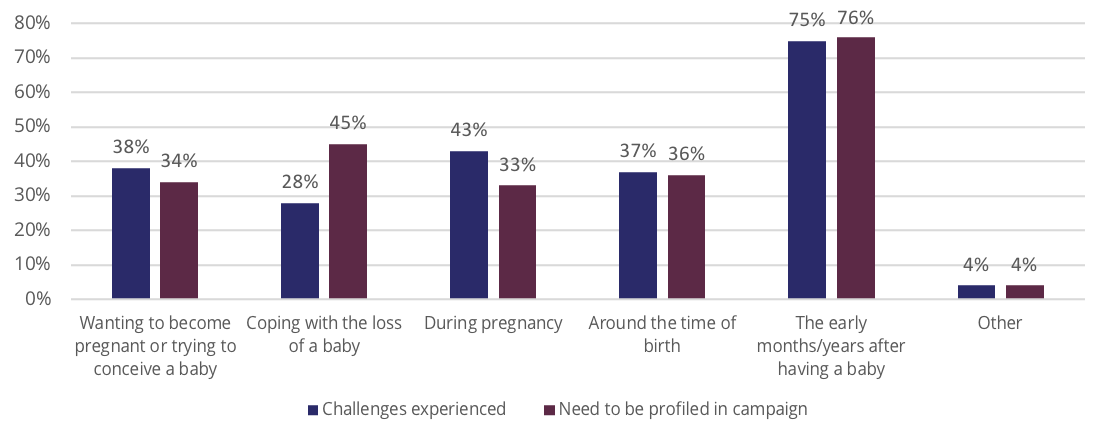Personal experiences of miscarriage

What the research had to say
COPE research undertaken with 1,899 consumers, revealed that twenty eight per cent of individuals identified challenges relating to miscarriage. This is likely the reflect the high incidence of miscarriage in the community. In most instances individuals had personally experienced a miscarriage themselves.

Source: Centre of Perinatal Excellence (2022)
Below are the key themes identified pertaining to personal experiences of miscarriage.
Initial shock and devastation
When describing the impacts of the most commonly reported loss, miscarriage, respondents described the initial shock and devastation when discovering they had lost their pregnancy.
“I was in a state of disbelief and took some time to accept this was the case. I ended up going back for several scans a week after the next at different locations with the hope that something was missed and the baby was still developing.”
Lack of support
Following this experience, women were often surprised to learn how common miscarriage is (while recognising that this did not make the experience any easier). In fact, miscarriage being so common often lead to the person’s experience being minimised or dismissed. This was particularly with reference to health professionals, but also by members of the community. In turn this prevented people from receiving the empathy and support they felt that they needed.
In part this is likely to be attributable to the fact that as miscarriage often occurred in the early stages of pregnancy, others were not aware that they were pregnant. Hence, while experiencing their grief and sadness, they also felt very alone and without the opportunity for support. Many described how the silence around miscarriage, despite it being so common, left them feeling ashamed.
“ I felt alone and ashamed because no one announces pregnancies before 12 weeks”
“Miscarriage is extremely common yet no one talks about it. It needs to be normalised so woman don’t feel so ashamed”
The inability to access support also extended to workplaces, where stigma remains.
“Working in a male-dominated workplace, I didn’t feel comfortable showing my emotions which made my day very hard to get through. It affected my mental health in a negative way.”
“There is still a stigma about talking about miscarriage and people seem to be ashamed, especially for women in the work place, it’s hard to talk about because then people know you’re trying to conceive and you risk the follow up question ‘are you pregnant yet’, when you might have been a week ago and miscarried again but weren’t ready to share yet.”
Common feelings
As with the area of infertility, respondents also reported strong feelings of anger or jealousy when others around them were successfully achieving pregnancy. This experience compounded their feelings of isolation, grief and failure.
“I tried to be happy for them, but it was hard to see pregnant women for a while.”
Sometimes, this sense of failure was directed at the woman’s physical body for not being able to maintain a pregnancy.
“As a person who suffered multiple miscarriages and had fertilised eggs not survive, the grief and resentment and anger toward my own body was high.”
“It took me a long time to love my body again as I honestly thought my body failed me.”
Long-lasting impacts
Not only was emotional and mental health impacted at the time of the loss, it also carried into subsequent pregnancies, resulting in high anxiety, distress and often depression.
“It broke all of us. Mentally and emotionally, we’ve all been scarred by the loss and it still affects our day-to-day lives.”
“[It had] a huge impact on both my husband’s and my own emotional and mental health. To fall in love with something so quickly to then have it taken away is excruciating and without any real closure or understanding as to why is difficult.”
For some the experience of repeated miscarriages prevented them from ever wanting to become pregnant again, so that they did not need to re-live the experience.
“I never want to be pregnant again because I don’t think I could handle another miscarriage, I genuinely believe I’d end up in a psych facility.”
What helped
Respondents who experienced miscarriage overwhelmingly shared that having their grief and loss acknowledged was important when it came to healing. Speaking to friends, family and others who had miscarried was also helpful.
Others said that seeking professional support was key in helping them to process their loss.
“I saw a professional counsellor/psychologist regularly for 3 months. She helped me exponentially and I was able to move past and accept what happened so we could start trying for a baby again.”
“I found it helpful chatting to a few close friends, some of whom I knew had also had miscarriages too.”